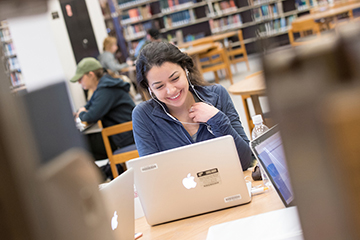
06/26/2020
SUNY Cortland is making it easier for teachers to earn a master’s degree by introducing a new fully online graduate program in literacy education.
The program leads to two teaching certifications in a discipline that applies to all subjects. The M.S.Ed. in literacy is intended for people who hold a bachelor’s degree and initial teaching certificate in education. Full-time students can complete it in one calendar year if they begin their studies in the summer or fall.
“Literacy skills are the very foundation upon which all education is built, and we need excellent literacy teachers and specialists to help students of all abilities, at all grade levels to develop these skills,” said Andrea Lachance, dean of the School of Education. “SUNY Cortland is proud to educate more teachers than any other public institution in New York state, and this exciting news offers further proof of our commitment to preparing teachers not just in our region but across our entire state.
“The faculty in the Literacy Department worked diligently to build this first exclusively online program in our School of Education and to ensure this program was of the highest quality. We're looking forward to helping teachers and students everywhere."
A master’s degree in literacy has the ability to make teachers more marketable and effective because it helps them work with readers in their respective content areas, according to Professor Nance Wilson. They can teach any subject, not exclusively reading.
“You can graduate and work as a reading coach or a reading specialist in a school district, but you also could be a science teacher helping students decipher material that’s traditionally difficult,” said Wilson, who helped facilitate the development of the program. “Every single subject relies on strong reading skills.”
Cortland-trained literacy teachers have gone on to work in school districts across New York state. They work as classroom teachers, interventionists, reading coaches and specialists within schools and district settings. This degree leads to two certifications cover birth to grade 6 and grades 5 to 12, and students can earn both by passing one test.
Even before the COVID-19 pandemic moved classroom learning to a distance education model, SUNY Cortland had plans to shift its graduate program in literacy education to a distance learning model in an effort to provide convenience and flexibility. The university previously offered the degree on campus and through hybrid class options that relied on both in-person classes and online learning.
Classes utilize pedagogical tools that assure student engagement and interaction. For instance, some classes will rely on apps such as FlipGrid, an asynchronous video chat tool that allows students to interact and learn.
“That’s a big emphasis of our program,” Wilson said, referring to support from faculty and staff. “Online learning will provide students the flexibility to learn from anywhere, but they’re still going to discover the same support from faculty members and campus offices that they would if they were sitting in a classroom on campus.”
Additionally, graduate students will continue to receive assistance from SUNY Cortland’s Field Experience and School Partnerships Office. This campus office coordinates early field experience and student teaching placements for Cortland teacher candidates, including those who are learning online.
Working teachers can pursue the program on a part-time schedule or take classes for professional development credit.
SUNY Cortland already has started to explore online learning capabilities within the program. The Literacy Department recently announced an online summer reading initiative matching graduate students with learners entering grades 2 to 12. The program reached capacity in two days.
“There’s a demand for great teachers with literacy skills,” Wilson said. “When students become better readers, they gain confidence in the classroom, they succeed later on as professionals and ultimately they become productive members of society.
“Reading is a lifelong skill.”
Visit the program webpage for more information.